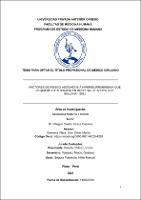Factores de riesgo asociados a hiperbilirrubinemia que requiere fototerapia en hospital de apoyo II de Sullana -2021

View/Open
Download
(application/pdf: 1.048Mb)
(application/pdf: 1.048Mb)
Date
2023Author(s)
Villegas Castro, Grace Carolina
Metadata
Show full item recordAbstract
Determinar los Factores que se asocian al requerimiento de
fototerapia en Neonatos que presentaron Hiperbilirrubinemia en el Hospital de
Apoyo II-2 Sullana.
METODOLOGÍA: Se llevó a cabo un estudio observacional, analítico,
retrospectivo, de casos y controles.
La población de estudio, estuvo constituida por 400 neonatos, con diagnóstico
de hiperbilirrubinemia, según criterios los inclusión y exclusión, siendo divididos
en función al requerimiento de Fototerapia en 200 controles y 200 casos.
Se utilizó pruebas no paramétricas, como la U de Mann-Whitney, para análisis
univariado, debido a que la mayoría, presento distribución no normal,
calculándose OR como medida de impacto; para contrastar la asociación de
variables, empleamos la Regresión logística bivariada para calcular el OR
ajustado, para las características neonatales y maternas
La hipótesis alterna será aceptada si el valor de p<0.05.
CONCLUSIONES:
Se evidencia que el sexo masculino mostró asociación significativa para requerir
tratamiento de iluminoterapia, (OR:13.7; IC: 8.50-22.1) así mismo, la presencia
de sepsis tuvo un (OR:9.79; IC:5.2-18.36) y el presentar tanto, cefalohematoma
(OR:14.2, IC: 6.53 – 30.8) como incompatibilidad ABO (OR:9.54; IC:6.40-16.86),
un peso al nacer <2.500 gramos (U=2403) aumento el riesgo respectivamente;
en cuanto a la progenitora, se demostró que la presencia de comorbilidades
como: diabetes gestacional ( OR:3.10; IC:1.73-5.57), preeclampsia presente en
el actual embarazo (OR:91, IC:46.5-177.7), infección de tracto urinario (OR:4.31;
IC:2.80-6.63) y una edad gestacional de 36 semanas (U=4538), se asociaron
fuertemente a requerir fototerapia. To determine the factors that are associated with the requirement
of phototherapy in neonates that developed hyperbilirubinemia at Hospital de
Apoyo II-2 Sullana.
METHODOLOGY: An observational, analytical, retrospective, case-control study
was carried out.
The study population consisted of 400 newborns, diagnosed with
hyperbilirubinemia, according to inclusion and exclusion criteria, being divided
according to the requirement of Phototherapy in 200 controls and 200 cases.
Non-parametric tests, such as the Mann-Whitney U, were obtained for univariate
analysis, since the majority presented a non-normal distribution, calculating OR
as an impact measure; To test the association of variables, we used bivariate
logistic regression to calculate the adjusted OR, for neonatal and maternal
characteristics.
The alternate hypothesis will be accepted if the value of p<0.05.
CONCLUSION:
it is evident that the male sex showed a significant association to require light
therapy treatment, (OR:13.7; IC: 8.50-22.1) likewise, the presence of sepsis had
a (OR:9.79; IC:5.2-18.36) and presenting both , cephalohematoma (OR:14.2, CI:
6.53 – 30.8) as ABO incompatibility (OR:9.54; CI:6.40-16.86), a birth weight
<2,500 grams (U=2403) increased the risk respectively; Regarding the parent, it
was demonstrated that the presence of comorbidities such as: gestational
diabetes (OR:3.10; IC:1.73-5.57), preeclampsia present in the current pregnancy
(OR:91, IC:46.5-177.7), tract infection urinary (OR:4.31; CI:2.80-6.63) and a
gestational age of 36 weeks (U=4538), were strongly associated with requiring
phototherapy.
Subject
Collections
- Medicina Humana [3196]

